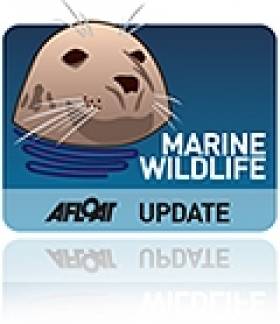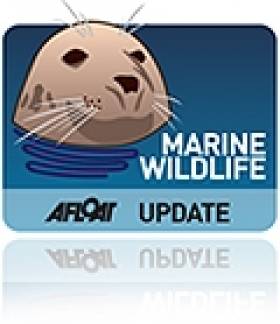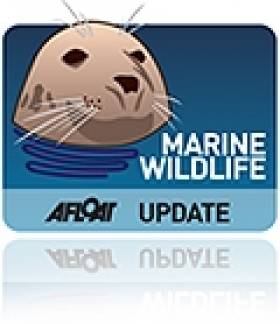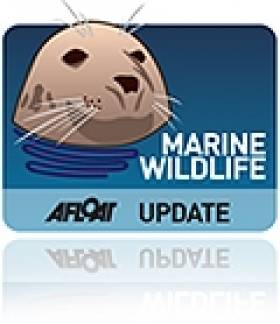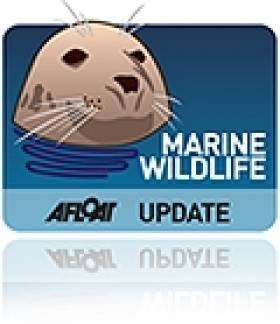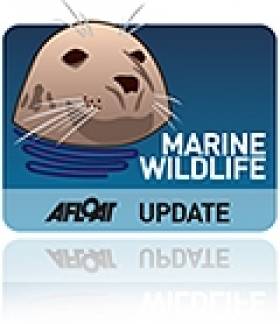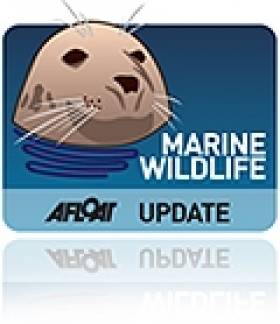Displaying items by tag: Loggerhead Turtle
Loggerhead Turtles Washing Up on Irish Shores Are Cause for Concern
Concern has been expressed over reports of endangered loggerhead turtles washing up on Irish and British shores in recent days, as BreakingNews.ie reports.
The remains of a deceased loggerhead turtle were found at Port Glais in Co Mayo over the weekend, while a live turtle was recovered in Anglesey in North Wales across the Irish Sea.
Loggerhead turtles are rarely found in Irish waters, with the last known sighting being a 50kg adult female in Connemara in December 2021 which died soon after it was recovered.
The marine wildlife species’ normal habitat is the warmer waters of the eastern United States, the Caribbean and Gulf of Mexico. In much colder climes such as Ireland, they can suffer often lethal ‘cold shock’, particularly when stormy conditions bring on sudden drops in water temperature.
BreakingNews.ie have more on the story HERE.
Loggerhead Turtle Dies in Galway After Being Blown Off Course From Canary Islands
A loggerhead turtle believed to originate from the waters around the Canary Islands has died despite the best efforts of Galway Atlantaquaria staff after it was found washed ashore in Connemara.
As RTÉ News reports, the 50kg turtle was discovered on Muighinis Beach near Carna in a comatose state and on the advice of the Irish Whale and Dolphin Group was taken to the national aquarium in Salthill.
However, Galway Atlantaquaria confirmed on social media that the adult female loggerhead turtle “never regained consciousness”.
It’s suspected that the turtle, who had been named Macdara after the patron saint of Connemara fishers, was blown off course during Storm Barra earlier this month into the colder North Atlantic.
Ninja The Loggerhead Out Of Intensive Care
#MarineWildlife - There's good news to report from the Galway Atlantaquaria as Ninja the loggerhead turtle is out of intensive care.
As previously reported on Afloat.ie, the 'cold stunned' reptile was close to death when she was rescued by staff at the Seal Rescue Centre in Courtown, Co Wexford after washing up on a Kilmore Quay beach before Christmas.
She was shortly after transferred to the longer-term care facilities at the Salthill aquarium, where she was treated for frostbite and wounds to her skin and shell.
And according to The Irish Times, the turtle is now over the worst of her ordeal, though she's missing a flipper and her skin will require more treatment.
The same staff at Galway nursed Leona the loggerhead back to health before she was flown to the more suitable warmer climes of the Canary Islands just over a year ago.
#MarineWildlife - Columba, the young loggerhead turtle rescued from near freezing waters on the Donegal coast last week, has died.
As the Belfast Telegraph reports, staff at the Exploris aquarium in Portaferry fought hard to save the junior turtle's life after it was discovered hundreds of miles from the warmer waters of the Gulf Stream, but it sadly passed away on Monday night (26 January).
A post-mortem was scheduled to determine whether illness may have caused the 12-year-old reptile to veer so far off course into Ireland's dangerously cold winter waters.
But for every sad story, the marine wildlife rehab staff at Exploris have many more happy tales to tell.
Since 1989, the Co Down aquarium has rescued 187 common seals, 253 grey seals and 10 loggerheads, with the vast majority returned to the wild in full health.
And they've come to the sanctuary from all over Ireland, with 1990 in particular being a big year for rescues of loggerhead turtles at Achill Island, Galway Bay and Brandon Bay, the aquarium's first.
There are some unusual rescue animals, too, such as a white lobster found in Carnlough in Co Antrim four years ago. The Belfast Telegraph has much more HERE.
#MarineWildlife - Leona the Loggerhead's last known whereabouts put her swimming south of the Canary Islands after her successful release last week, according to The Irish Times.
The female sea turtle jetted off with Aer Lingus to the warmer waters off northwest Africa after almost a year in rehabilitation at the Galway Atlantaquaria, following her lucky discovery on a beach at Quilty, Co Clare.
As the video of her release shows, Leona took to the water with ease - after a little human help - and is now likely looking for suitable feeding grounds of the coast of Morocco.
“She hasn’t swum north yet – but if she does head northeast, we would hope she would head for the Mediterranean, where there is a turtle colony,” said Joanna Casserley, who flew with Leona in economy class to Las Palmas a week ago.
The Irish Times has much more on the story HERE.
Loggerhead Turtle Will Fly To New Home Next Week
#MarineWildlife - There's some great news for Leon - or Leona - the loggerhead turtle, who will finally be jetting off to her new home next week.
According to RTÉ News, the Irish Whale and Dolphin Group (IWDG) has arranged special transport with Aer Lingus for the turtle, who spent much of this year being nursed back to health by Galway Atlantaquaria staff after she was found beached at Quilty in Co Clare last November.
Plans were made to relocate her to the much more hospitable climes of the Canary Islands last month, but safe transport was a stumbling block, prompting the IWDG to put out a call earlier this month for berthage on a private jet.
But thanks to the intervention of Dublin Zoo, Galway Atlantaquaria and Rod Penrose of the UK Cetacean Strandings Investigation Programme, suitable travel arrangements have been made with Are Lingus to fly the turtle - with two carers - direct to Las Palmas, from where her future exploits in the wild can be followed online.
Private Jet Sought To Fly Leon The Loggerhead To New Home
#MarineWildlife - Leon, the loggerhead turtle nursed back to health over the past year, has been ready to return to the wild since last month, as plans were made to relocate her to warmer waters off the Canary Islands.
But as RTÉ News reports, the Irish Whale and Dolphin Group (IWDG) – which recovered Leon from a beach near Quilty in Co Clare last November – has struggled to find transport to get the turtle to her new home.
According to the IWDG's Dr Simon Berrow, flying her there by commercial airline is out of the question "due to issues with transport of live animals [and] long overnights in the hold in Madrid with no access to her".
However, passage on a private jet might be the answer - provided an accommodating owner can be found.
The IWDG website has more on the story HERE.
Leon The Loggerhead Headed To Warmer Spanish Waters
#MarineWildlife - The Irish Times reports on a change of plans for Leon the loggerhead turtle, who was expected to be released back onto the wild last month but is now headed for much warmer climes off the Canaries.
Leon has spent almost a year in rehabilitation under the care of staff at the Galway Atlantaquaria after she was found washed up in critical condition on a beach near Quilty in Co Clare last November.
Nursed back to full health as the months progressed, it was expected she would be released into the sea with a celebration at the Salthill aquarium on 21 September.
But the warmer waters in the turtle breeding grounds off the Canary Islands was thought a more appropriate spot for her reintroduction to the wild, and she's set to jet off in the next few days. More on the story HERE.
Leon The Loggerhead Returns To The Wild This Sunday
#MarineWildlife - The Clare Herald reports that a loggerhead turtle who stranded on a beach near Quilty in November year will soon be fit for release back into the sea.
As previously reported on Afloat.ie, Leon the loggerhead – named after the famous Quilty shipwreck – was rushed to the Galway Atlantaquarium for rehabilitation after a local woman spotted the rare visitor to Ireland's shores.
After some 10 months of care at the hands of the aquarium's marine wildlife experts, Leon is now set to return to the wild, with a big celebration planned for her release at the Salthill aquarium this Sunday 21 September.
Dead Minke Whale, Poorly Turtle Stranded On Irish Beaches
#MarineWildlife - BBC News reports on the sad story of a nine-metre long minke whale found dead on the beach at Magilligan Point in Derry.
According to the Irish Whale and Dolphin Group's (IWDG) Pádraig Whooley, minke whales have been "reported with increased frequency off the Antrim and Down coast" and there have been sightings in he past week off Donegal.
The incident marks the third whale stranding on the Northern Irish coast since September, when two died after beaching in North Antrim.
In more positive marine wildlife news, a loggerhead turtles is being cared for at the Galway Atlantaquarium after stranding in a bad condition in Co Clare during the week.
The Irish Independent reports that the turtle, named Leon after the famous Quilty shipwreck, was recovered after a local woman alerted marine wildlife experts.
“You might see a loggerhead turtle wash up every couple or three years but not very often at all," said Dr Simon Berrow of the IWDG, who said the turtle may need several months' rehab before its fit to return to the wild.
That's an issue that presents its own challenges due to its smaller size and distance from its usual tropical waters.



























